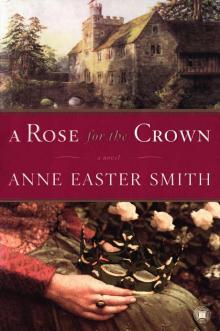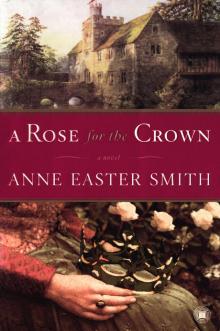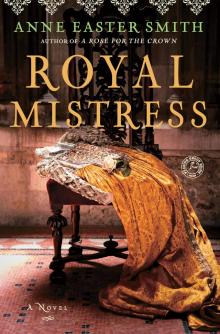- Home
- Anne Easter Smith
The King's Grace Page 5
The King's Grace Read online
Page 5
“There is nothing wrong with being quiet and serious, John. Look at me,” Grace countered. “I think I have a good heart, but I do not say very much.”
John laughed. “Touché, ma belle,” he replied. “Although you were unafraid to stand up for yourself a moment ago.” He thought for a moment, studying his fingers, and then chose to confide in her. “When my father was with my mother, he was a different person. The last time I saw them together was when I took Mother to his audience chamber at Leicester Castle, two days before the battle. As soon as he saw her all the worry on his face seemed to dissolve, and his smile made him look young again. I knew then I had been born of real love—both me and”—he bowed his head—“my poor sister, Katherine, God rest her soul.”
“Where does your mother live, John?” Grace said, crossing herself and hoping to divert his attention from the loss of his sibling.
“She lives in Suffolk, not far from the coast, in a house on Jack Howard’s estate—he is…was…the duke of Norfolk,” he explained, and Grace nodded. “’Twas exactly like her to disavow Jack Howard’s advice about traveling to Leicester at such a dangerous moment. But she was determined that Father should not hear of Katherine’s sudden death from anyone but her. She told me first, and I know my sorrow was but a drop in the pail compared to his. He loved Katherine greatly—his first child, and his only daughter. I was standing outside the door and heard his suffering upon the news. ’Twas savage.” He gazed at a point in the fireplace as he remembered the scene. Afraid for his mother, he had quietly opened the door a crack and seen her comfort Richard; they had even shared a kiss.
“My mother is not of gentle stock,” he said, bringing his gaze back to Grace’s face. “And yet somehow she befriended Howard’s wife. One day Mother was an invited guest at Tendring Hall and met my father when he was hunting there with Sir John. Father loved hunting—especially with his falcon.” His voice fell back into a monotone.
“What is she like? And what is her name?” Grace asked, again hoping to steer the conversation to the living and away from the dead.
“Mother is stout-hearted!” he said, his face lightening. “And her name is Kate…Katherine Haute, of Snoll’s Hatch in Kent, she used to tell people. Her father, my grandfather Bywood, was a farmer, but I never knew him. ’Twas mother’s forthrightness that often got her into trouble, so they tell me, but it also made people love her. They say I am more like my father, but I have inherited Mother’s love of singing. She has the voice of an angel, and Father told me once that he fell in love with her the first time he heard her sing.”
Grace’s eyes shone. “Sing something to me, John. I would hear your gift.”
Unabashed, John began to sing in a strong tenor:
“Our King went forth to Normandy,
With grace and might of chivalry;
The God for him wrought marv’lously…”
Suddenly his voice became choked with tears, and the next words were almost inaudible.
“Wherefore England may call and cry,
Deo gratias.”
He buried his head in his hands, and tears fell from between his fingers. Grace sat stupefied, every nerve in her body itching to put her arms around him and comfort him, but her reserve got the better of her. A few seconds later she was glad she had refrained from her urge, for he sat up straight, wiped his face on the sleeve of his shirt and grinned sheepishly.
“Forgive me for being addlepated, Grace. I should not have attempted that particular song, in truth. It always reminds me of the time Mother put me in Father’s care when I was six, and I had to say good-bye to everything I knew. She sang it to me the night before we parted. Foolish of me. Am I forgiven?”
“Dearest John,” Grace whispered. “There is nothing to forgive. My mother died when I was so young, I do not remember her. But there is still a pain in my heart for my loss. And I never knew my father.”
John looked at her curiously. “I have often wondered why Dame Grey sent for you, Grace. Do you know? After all, would she not want to forget her husband’s infidelities? You would be a constant reminder.”
“I heard from an attendant that ’twas a promise Dame Grey made to my father upon his deathbed. He knew where I was and had paid the abbey to keep me, so I was told. Dame Grey was keeping a promise, I believe, and I thank God daily for it—even if I do feel a misfit sometimes.”
“Aye, little wren, ’tis ironic how very lonely one can be even in a big family. And now my sister is gone, I am even more alone—” he broke off, sighing.
“But you have me,” Grace whispered.
“Aye, so I do. I am a lucky man,” he said, holding her chin in his fingers. Grace willed him to kiss her, but footsteps along the corridor caught their attention and John rose when Bess and Cecily ran in to greet him. He has forgotten me already, Grace thought miserably, rising from her stool.
“We have been so worried, John,” Bess admonished him, beaming at Grace. “Tom told us that Grace had the magic touch, and I am right glad to see you looking well again. We have news of Lord Lovell to tell. It seems he was able to hide among the returning Howard force into Suffolk and has sought sanctuary at Colchester, as have the Stafford brothers.”
“Praise be to the Virgin,” John said, crossing himself. “I am right glad to hear it. And what of our cousin Lincoln? Is he fled, taken”—he paused for a second before daring to ask—“dead, as was rumored?”
“Nay, he is alive. Henry keeps him close by, so the messenger says,” Bess replied.
“What is that vile smell?” Cecily suddenly interrupted, her face screwing up in disgust.
“Cecily!” exclaimed Bess. “Where are your manners? ’Tis not your place to find fault. You know Mother taught us that.”
Cecily pouted, used a corner of her veil to cover her nose and flounced off to the window. “Aye, but she isn’t here, so where is the harm?” she retorted.
Bess looked shocked but decided to ignore her. Grace was used to Bess’s dutiful demeanor and felt sorry for her. It must be hard to be the eldest of so many children, she decided, and have to be a model for the rest.
“I have not been as fastidious as I might these past three days, ’tis all, Cis,” John answered, grinning. “Forgive me. Come, let us get some fresh air.”
“Aye, before I swoon,” said Cecily, and eyeing a pile of Bran’s excrement in her path, she lifted her skirts well above the rushes and hurried from the room.
FOR THREE WEEKS those in the castle tried to settle into their usual routines. September’s sun warmed the reapers as they gathered in the sheaves of wheat, and in other fields ploughmen forged their straight furrows, making them ready to receive the hardy rye seed. Ax and adze felled trees and made logs for the winter fires that would burn from November to spring. Grace wondered how cold it would get here, and she shivered when she thought of how the wind would change direction and come down from the north to chill their bones.
But thoughts of winter were far away as she strolled around the inner bailey one afternoon and watched the turner with his pole lathe making mugs and bowls, the blacksmith raining a blow on a red-hot horseshoe, a laundrywoman carrying a basket of linens on her head and a wheelwright mending a cartwheel. The craftsmen knew her by now and called “Good morrow, Lady Grace” in their strong Yorkshire dialect, and she smiled, acknowledging their salutations. Hearing her title always gave her a start, and she thought she would never get used to her new status. She found she actually missed the work in the garden that used to take up much of her day at the abbey, but here she was not required to lift a finger—except to hem a gown or embroider a kerchief.
She arrived at the kennels to check on her favorite pup and was about to gentle him away from his mother’s tit when a villager ran headlong through the gate, shouting, “The king’s messenger be coming!” He was accosted by a guard and prevented from advancing farther, but by then the watchtower sentinel was also alerting the castle to an unexpected visit. He blew on his shawm, its raucous re
edy racket causing Grace to stop up her ears and a dog to howl.
“John!” she mouthed, frightened, “The king must not find him here.” Taking to her heels, she raced into the northwest tower, up the narrow twisting stairs and out onto the rampart. John, Tom and two of Tom’s Gower cousins had gone hunting after dinner at noon and had not yet returned. She scanned the forest but realized all she could see were the tops of the trees. The retinue of Henry’s men must surely have passed through the forest from York through Strensall, so perhaps John had seen them and remained hidden. Odds bodkins, she thought, why have I not yet learned to ride? John had promised to teach her, but until he did, she could only ride pillion behind a groom or, on occasion, Cecily, who was an excellent horsewoman. The huge beasts terrified her. The nuns had owned a large ox that pulled the convent cart into Leicester on market days to give the leftover convent produce to the poor. The beast was placid, and Grace had been put on its back once by Sister Benedict, one of the younger nuns, who had taken the child under her wing. But when the ox swished its tail at some pesky flies and struck the little girl, she lost her balance and fell off. She had been afraid of large animals ever since.
Realizing her mission was futile, she ran helter-skelter down the spiral stairs to her chamber to alert her sisters. “The king is come!” she said breathlessly.
Bess dropped her needlework onto the floor and the lutenist missed half of the strings on a downward chord, creating a discordant twang that lent an ominous note to Grace’s pronouncement.
“The…the k-king?” Bess whispered. “Henry is here?”
“The villager said ‘the king’s messenger,’” Grace explained. “I thought the king would follow behind.”
“You witless girl,” cried Bess’s tiring woman, throwing her arms around Bess and glaring at Grace. “A messenger from the king means the king is not here. You have frightened my poor sweeting half to death.”
Tears sprang to Grace’s brown eyes and she begged Bess’s pardon. Hiding her unhappiness, she walked quickly from the room, noticing Cecily’s smirk at her older sister’s dismay. I hope Cis’s betrothed is a toad, Grace thought uncharitably, even though she had met Ralph Scrope of Upsall at court, and he had done nothing to deserve such an unkind moniker. She paused at the tower entrance to watch the horsemen dismount and the grooms lead the horses away. A stout man with a long drooping mustache was solemnly greeted by Tom’s uncle as “Sir Robert,” and Grace found out later the man’s name was Willoughby and that he was steward of the king’s household. Catching sight of Grace in the doorway, Sir John Gower hurried up to her and requested that she and her sisters ready themselves to meet the king’s messenger.
“I will send for you all anon, my lady, as soon as Sir Robert has slaked his thirst,” he directed her, and stomped off towards the great hall.
Bess’s lovely face was pale with fear when Grace gave her the message, but her ladies gathered round, untying her sleeves at the shoulders, unlacing the tight bodice and slipping her skirts to the floor. They chose a deep crimson damask gown with blue facing and trimmed with miniver to show off her stature and porcelain skin. She had inherited the best of both her handsome parents, and with her wavy golden hair tumbling to her knees, Grace thought she had never seen anyone so beautiful. In no time at all, the ladies coiled the unruly tresses into a knot on the back of Bess’s head and pinned a fashionable short hennin over it, which hid all that glory from the prying eyes of men. A simple wire frame attached to the hat supported the pure white gauze veil that stood out from her face. A collar of gold set with pearls and sapphires completed the portrait of a princess—oldest child of King Edward the Fourth.
As the attendants were busy dressing Bess, Cecily, Grace and Margaret helped one another into more fetching gowns, and a little later, when the sun was dipping below the west wall, all four stepped across the great hall’s threshold.
“I am ready to face the enemy. Wish me well, sisters,” Bess whispered as Sir John Gower came forward to take her hand and lead her to Sir Robert.
“For inspection,” Cecily muttered angrily. “As if she were a horse or a cow.”
Grace shuddered and her heart went out to Bess, standing there so regally, being ogled by the middle-aged Willoughby. Cecily and Margaret took a few steps forward and Grace followed, hoping she was well hidden behind Cecily’s larger girth. Sir John sent Tom to escort them to cushioned stools against the wall and out of the bright light of the massive chandelier dripping wax from a hundred candles. They could not hear what was being said to Bess, so Cecily started to bat her eyelashes at one of Sir Robert’s knights, but Grace folded her hands on her lap, stared at her fingers and retreated inside her comfortable shell.
She thought back to a conversation she had had with Bess one day in the meadow when Cecily had been confined to the castle during her courses. They were making a garland to help cheer their sister, and Grace suddenly noticed Bess was crying.
“What it is, Bess?” she asked, full of concern. “May I help you?”
Grace’s gentle voice and sympathy only caused Bess to sob more, and to avoid Tom Gower noticing and causing Bess embarrassment, Grace left her spot on the grass and knelt in front of her sister, taking the older girl in her arms.
“Come now,” Grace soothed, sounding more like a mother than a girl of twelve. “You can tell me. I swear on the Virgin I shall not breathe a word to anyone. What is it?”
She stroked Bess’s forehead and pushed a wayward golden strand of hair off the girl’s wet face. Then she proffered Bess her kerchief. “Sweet Bess, blow your nose and tell me of your troubles. Like as not I shall not understand, but Sister Benedict always said ’tis good to tell your heartaches to someone.” She paused, knowing that the good nun may have had God in mind as a listener, but she pressed on. “When you share, it becomes someone else’s care.”
Bess did as she was told and blew her nose. Then, her tears spent, she contemplated the young girl in front of her. “You are a curious child, Grace. So green, and yet so wise. In truth, I know not how to treat with you sometimes. You are not so clever as Cecily and yet you are cleverer.” She shook her head. “I am not making sense, I dare swear. But since you ask, I will tell you why I am distressed. I cannot speak of these things to Cis, for she either laughs at me or becomes as watery as the conduit in the Chepe.”
Grace had no idea what Bess was talking about, but she nodded sagely. “I am listening, Bess,” she said. “Is it about King Rich…I mean, Uncle Richard?”
“Nay, it is not!” Bess was emphatic, her brows snapping together. “What do you know of that, pray?”
“Nothing very much,” Grace assured her, as she sadly realized her presence at Westminster must have gone unnoticed during the months before Queen Anne’s death, when the subsequent rumor about Richard and Bess was circulated. She wished she had been more forthright during those times, but she was learning. She had accepted that she was an inconsequential member of this royal brood, and as such had done her best to stay out of everyone’s way at court.
“I regret I made no impression upon you back then, Bess. But I was there; I saw what happened,” she said quietly.
Bess was aghast at her faux pas. “Forgive me, Grace,” she cried. “Certes, you were there. My mind is elsewhere, I have to confess.” She sighed. “I have thought much about my feelings for our uncle since we were all sent here, and I see ’twas naught but a young and foolish fancy I had. Nay, my thoughts were far from the king, in truth.” She hesitated, ashamed of herself for crying in front of the younger girl. “I was remembering a time long ago, when I taught our brother—sweet little Dickon—how to make a daisy chain, like this one. And it reminded me that I may never see him or Edward again.”
Grace nodded. “One of your mother’s ladies told me she thought Uncle Richard had…” she did not dare finish.
“I do not want to believe it, Grace,” Bess answered sadly, “but where have they been all this time? It has been two years since we’ve had w
ord of anyone seeing them at the Tower.”
“Perhaps they were sent away for some reason,” Grace ventured, her curious mind already conjuring up several. There was nothing Grace loved more than a mystery, and finally someone was addressing this one. “You cannot give up hope yet, Bess.”
Grace’s earnest little face made Bess smile. “I suppose you are right. ’Tis possible Uncle Richard sent them to our Aunt Margaret in Burgundy. I did hear such a rumor after we left sanctuary. But why would he not tell us?”
“I know not. But why were you in sanctuary, Bess? No one has ever explained that to me. Anne, Catherine and Bridget did not tell me much except that it was cramped and cold. Were you all there?”
“Aye. Certes, except for Ned; he was in the Tower.” When Bess saw Grace’s puzzled frown, she elaborated: “You see, when Father died so unexpectedly, Mother quickly sent word to her brother, Uncle Anthony—Lord Rivers—at Ludlow, where Ned was under his guardianship, preparing for the day when he would be king. Who would have guessed that day would come so soon?” she mused, shaking her head. “But no mind. ’Tis said Mother wanted to be regent, and so needed to have Ned with her in London to win over the people and Parliament. She asked Anthony to hurry to London with Ned. But, you see, when he was dying, Father named Uncle Richard as Lord Protector, meaning he would rule until Ned reached his majority and Mother would have no power. And so she ‘neglected’ to send a messenger north to Middleham and hoped Rivers and Ned would reach London first. ’Twas a rash decision that led Uncle Richard to believe Mother and Uncle Anthony were acting treasonously.” She paused for Grace to take this all in. “That is the side of my mother I do not understand—or, God forgive me, admire,” she remarked, tearing apart a daisy. “Why would she do such a thing? Uncle Richard was a good man; he would not have treated her unkindly.” She caught Grace’s surprised expression at this confidence and muttered: “Pray forgive me, I am thinking aloud.”

 This Son of York
This Son of York Queen By Right
Queen By Right A Rose for the Crown: A Novel
A Rose for the Crown: A Novel A Rose for the Crown
A Rose for the Crown The King's Grace
The King's Grace Daughter of York
Daughter of York Royal Mistress
Royal Mistress